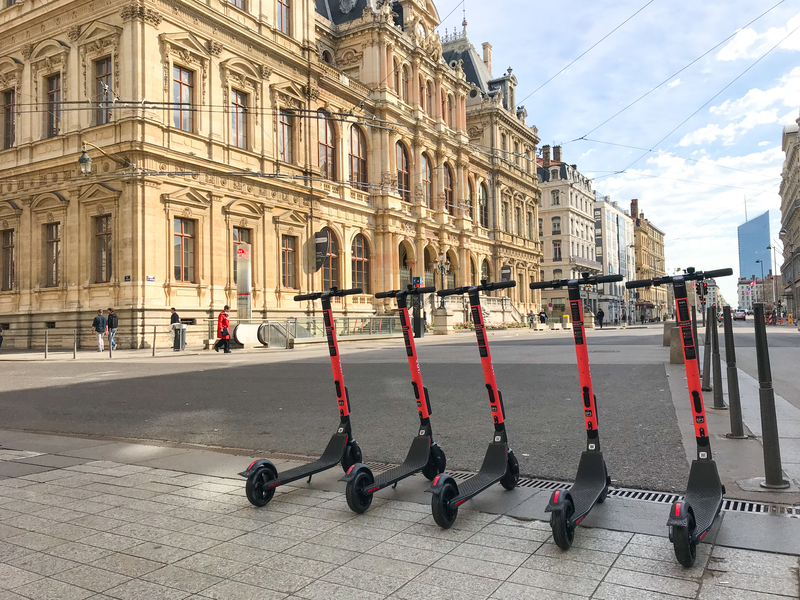
Mobility as a Service (MaaS) was big news for a while: the world’s first MaaS company, MaaS Global, raised $75 million in funding from blue-chip investors including BP Ventures, Toyota and Mitsubishi, and employed over 100 staff at its peak. Its Whim app was rolled out in several global cities and regions. But earlier this year, MaaS Global filed for bankruptcy. Rotterdam-based Umob has acquired its technology, but for founder Sampo Hietanen it is time to step away – for a while at least.
“I’m glad MaaS Global has a nice home, it’s good to see,” he tells ITS International on the line from his home in Finland. “You know, the whole thing needs new blood, new fresh blood…” (he pauses)… “to suck”. Hietanen laughs. But he’s right - at times it must have felt as though the energy was draining out of him as he fought to keep the company afloat, carrying people’s hopes with him.
The combination of Covid and other financial pressures “was quite a hot one”, he says with understatement. “We realised that with all the legacy and all the trouble that we had, MaaS Global itself became very hard to invest in, put it that way.”
"I did know from the beginning the chances were very slight"
With good reason, Hietanen has been called the ‘father’ of MaaS. “Personally, running eight years, being founder, CEO chairman, and not just that but also the guy having to push the whole MaaS concept as such - it's been, let's say, a lot of cognitive load. The last years were really not easy. In some ways it's a relief to not be in in the middle of all that, all the time. I realised that if I was the one who came up with the concept for the last eight years, I haven't really used my brain for any kind of ‘music in your soul’. So hopefully there's a bit of time for that, a bit of reflecting, maybe.”
Hietanen thinks he can help others with what he’s learned and has set up a consultancy, Aspectu. “I think I've been fortunate enough to see quite a lot from the inside, and also see what's keeping us back a lot - and let's see, hopefully I can use that to some benefit.”

‘Magnificent corpse’
Looking back, he thinks a number of factors explain MaaS Global’s demise. “The first was that I founded the company in 2015 and it was obvious to me that the likelihood that we were too early is very high. I was very, very much aware of this as the reality. Then you need to ask yourself: ‘Okay, there's a chance of changing something really remarkable that could have a big impact on everything. And then there's the timing: you'll have the trouble of being the first one - most likely you're going to be the ‘magnificent corpse’ out of all this. Should I not do it? What's the outcome of that? Okay, everybody just waits, waits, waits - because somebody has to be the first one. So we went on, quite deliberately. The first steps were to prove that it's even doable, technically and conceptually. Yes, it was. Second was that, yes, people love it this way - which is also very true, we were able to prove that. Also, we got to a point of proving that yes, you can actually make a profitable business out of it.”
He gets into his stride. “I mean, I remember the days when everybody said ride-hail will never work, micromobility will never work. And it is true until somebody gets enough money to make the UX [user experience] really good and scale it well enough - and that part we never got; that needs the rounds of hundreds of millions [of dollars].”
MaaS Global did attract significant financing. But in March 2020, Covid happened and the world shut down within days. This is where Hietenan made an error, he says. “You have to base your decisions on some kind of prediction of the world and there will be two choices: will Covid last for long or will last short? We calculated that if it is up to six to nine months, then we should not ramp down the whole organisation and start really saving and putting everything on freeze because then the ramp-up would cost more. So we did not ramp down - which was a mistake. It lasted much longer. We were able to suffer and find enough funding so that we did have the chance, right after Covid, [to say] let's go and show the world that yes, there's growth in it.”
“If you don't have the capacity to get to critical mass, it's going to be a struggle”
But then came Russia’s invasion of Ukraine in February 2022, which Hietenan says was a factor in making investors edgy about putting money into riskier ventures, such as MaaS. While this meant scaling up was not going to happen, Hietanen pivoted. “We had been able to put together a very good product, very good tech, understanding all of that,” he explains. “What if we go for licencing and let's try it differently. Take away the risk element of going with the Whim brand. Many players that have a lot of users are touching a bit on mobility but do not want all the trouble that comes with it. [They] don't have the capacity to build the product, to build the relationships, to build the tech, so if somebody has that and has proven that it functions with consumers, we could licence it out. There is a lot of hidden willingness to invest in the markets, from insurance companies, telecom companies, real estate giants.”
And indeed there was some interest, he says, but ultimately it was not sufficient. “Even though we had very good partners, at some point it just didn't work well enough. And the only way left was that, okay, we'll have to shut it down.”

Consolidation wave
The world’s micromobility sector has seen considerable consolidation over the last few years, as its ‘Wild West’ period ends, and regulation and reality set in. Micromobility is a component of MaaS, so did this contraction have any bearing on MaaS Global?
“It was obvious, whether it's MaaS or micromobility, that at some point there will be a consolidation wave - with every industry, that's what happens,” says Hietanen. “I'd say that it has more to do with the drying up of big investments for growth. So the financial crisis is much bigger than probably people understand. When you have a completely new concept, for sure it needs big investment. MaaS is a critical mass game, however you look at it. And if you don't have the capacity to get to critical mass, it's going to be a struggle.”
Ride-hail and micromobility had already reached this point, he says. “The bigger investments for growth dried up and of course there's a certain amount for mobility and the [companies] that were there had a proven business case, so they took a big chunk out of it.”
Ride-hail and micromobility are also concepts that consumers can easily understand, whereas MaaS is both completely new and more complicated. So has one of the problems been that people simply didn’t understand what it offered them?
“I'd say yes and no,” Hietanen says. “Starting this, I was very scared that do people even want this kind of thing at all? I'm not worried about that [now] - we were able to prove strong enough that [the demand] does exist.” But, he goes on, it’s vital to get two things right or you risk drawing the wrong conclusions about the attraction of MaaS.
“Ride-hail and micromobility didn’t became a big thing until somebody had enough money to do two things: get the UX right - and this is not cheap. UX has to be top-notch or you're not going to get any results out of it. You will not know whether people want it or not if you have a very poor UX. The second part is that you have to kind of bring in the phenomenon that ‘hey, this is doable, you can actually access very simply everything from a one-stop shop’. So a lot of the big things are, in a way, unproven due to nobody doing it properly.”
He is frustrated that conclusions are drawn about MaaS from “very poor pilot projects, with completely nonsense UX and then you say ‘well, people didn't like it ‘– of course they didn't!” For example, the difference between a five-second unlock time on a shared bike, and a two-second unlock time, “is enormous”. He adds: “And of course, if you just do a pilot project with not enough money for UX, you'll end up with five seconds and people say ‘no, I didn't like it’ - of course, because you didn't do it properly.”
He is convinced there is a desire for one-stop access to mobility services in some segments: “What's not known is: what's the price perception, what are they willing to pay for it? It's very hard to draw very big conclusions out of MaaS without very big market deployments.”
Is this MaaS?
And MaaS is happening without necessarily being called MaaS, he insists. “The likes of Uber and Bolt are doing MaaS: I mean, they have multiple modes and they're doing it, yes, from their perspective, but it is exactly the same. They have got already past the point that they have enough money to do the UX always properly. They are already multimodal, they do have the customer base, they do have the operations. So it's very clear that they're going to be the winners in this MaaS world - even if they don't want to call it that way.”
There is another alternative path for MaaS, he thinks. “Mobility itself is not worth much, it's more to help you get to other things, which could mean that the whole industry will be embedded into others,” he explains. For instance, in a supermarket app you could receive bonus shopping points if you visit a store using a shared bike or public transport. “I think it's a very obvious case,” Hietanen says. “And these kinds of combinations do exist. It's just that we in mobility have thought that everything integrates to us, not vice versa.” So instead of validating customer parking, retailers could validate customer mobility.
“We in mobility have thought that everything integrates to us, not vice versa”
“I think it will come to that,” he insists. “The world of multimodality is not good from a user perspective at the moment because it's siloed. So it's not a comprehensive service to you.” Something else is required to get “even close to the point of what the car is now providing you; it provides the certainty of [getting from] any A to any B. Integrated UX will have to happen if we ever want to be anywhere near that level. [A supermarket] doesn't really care - is it Uber? is it Voi? is it Tier? - they don't really care, they just want you to get there.” In the mobility sector, “we're the ones [who are lagging] behind. It wouldn't hurt that we start being integrated into the rest of the world.”
This is something Hietanen had not realised at the beginning of his journey with MaaS Global. “Definitely,” he agrees. “Had we pushed it more towards that I think we would have had a much better chance of survival, really. So this is definitely a learning and really pisses me off!” He laughs once more. “I didn't get it fast enough and make it strong enough.”
What other general learnings from his experience does he think would help other players in the mobility sector?
“There will be probably hundreds and hundreds of them,” he smiles. “I suppose the one good takeaway is: always focus first on the product/market fit. We were in some places a bit too fast just to get the different numbers here and there and I was not stubborn enough to say that no, we really need to fix the product/market fit so that we are absolutely sure what we are then scaling. I knew it from the beginning but it's so easy to stray from that. The user case is everything. We went too much with the idea that first let’s do this pay-as-you-go, that's good enough for people. But we realised quite late that it's not. Actually people do not see the value of you showing what kind of modes of transportation [are available] - that exists: Google and others are very good at that already.”

‘Differentiate a bit’
Even just having the capacity to make payments conveniently won’t be enough, he argues. “It's not that they wouldn’t like it - it's more that they don't get it. They will ask: are you now a taxi app? Or are you a micromobility app? Or a public transport app? And many of your customers will use you for just this ‘one trick wonder’ and it's very hard to be better than Tier or Voi in micromobility. You're not going to be better than that. You're going to be better in the combination of fast access to everything. You have to really get into the subscriptions - which was our original thing - but we never put enough effort into it. If the whole idea of MaaS is that it's a multimodal service, then put your money where your mouth is because that's how people get it. So we probably should have put almost all of our efforts and money into creating these packages, bundles, subscriptions, however you want to call them - and that we didn't do: we kind of fell in to the trap that pay-as-you-go is easier to just get a lot of numbers, you just resell public transport tickets – and then you're steering away from what the whole idea was.”
A MaaS subscription priced at less than the average monthly price of owning a car – which MaaS Global mooted when it launched in Birmingham, UK - was a really interesting offering. “If I would do it now I would just focus really on that one,” Hietanen admits. “You should really focus on subscription because that's a new thing. That's a bold thing. It's a harder sell but it's the right way. Differentiate a bit.”
Despite now forming Aspectu, he doesn’t completely rule out coming back to MaaS full time. “Never say never to anything,” he grins. “I do have passion for getting this done. Now I know much more that it's not a one-man, it's not a one-company, show. The ecosystem needs to be ready; you can’t be in the markets if the markets aren't there.”
“It's not a one-man, one-company, show: the ecosystem needs to be ready”
Creating that environment is “very, very demanding”, he points out with feeling.
“Now, if I could kind of dream a bit: if I can help the ones that should be setting the markets - meaning the cities and governments - in doing it properly, I would really love to help them [but] only if they want to listen to advice as well. I would really like to help the ones that are in MaaS to avoid maybe some of the [pitfalls] but it's hard doing that without becoming a wise-ass.” He laughs again. “You know, you become easily too blind to your own thoughts but I suppose at least telling what happened, I think that they could avoid some things.”
He believes there could be mileage in talking to the automotive industry, too. “I think they're a bit lost when it comes to mobility and what does it have to do with their cars? Many others are also struggling to get their head around what should they be doing in MaaS, so if I can help them with their strategy, those are the things that actually interest me. I think for the time being I'm much better in a role of being on a board or something like that.”
Being a business owner, and a pioneer, is hard work. “These roles like what I had in MaaS Global, they kind of suck the life out of you,” he concludes. “Either you're completely in or you're not. I try to take comfort that I did know from the beginning the chances were very slight - but maybe if I can say that I shifted the world a bit towards something that’s right, then it’s been worth it.”











